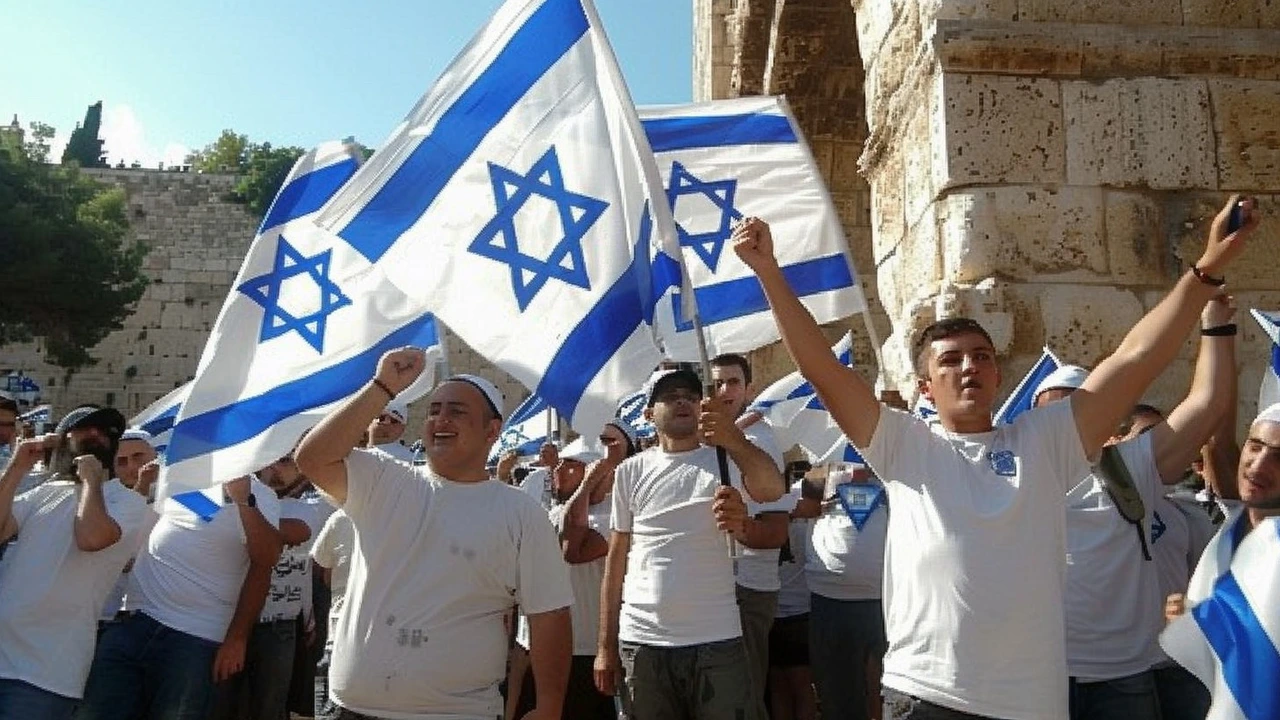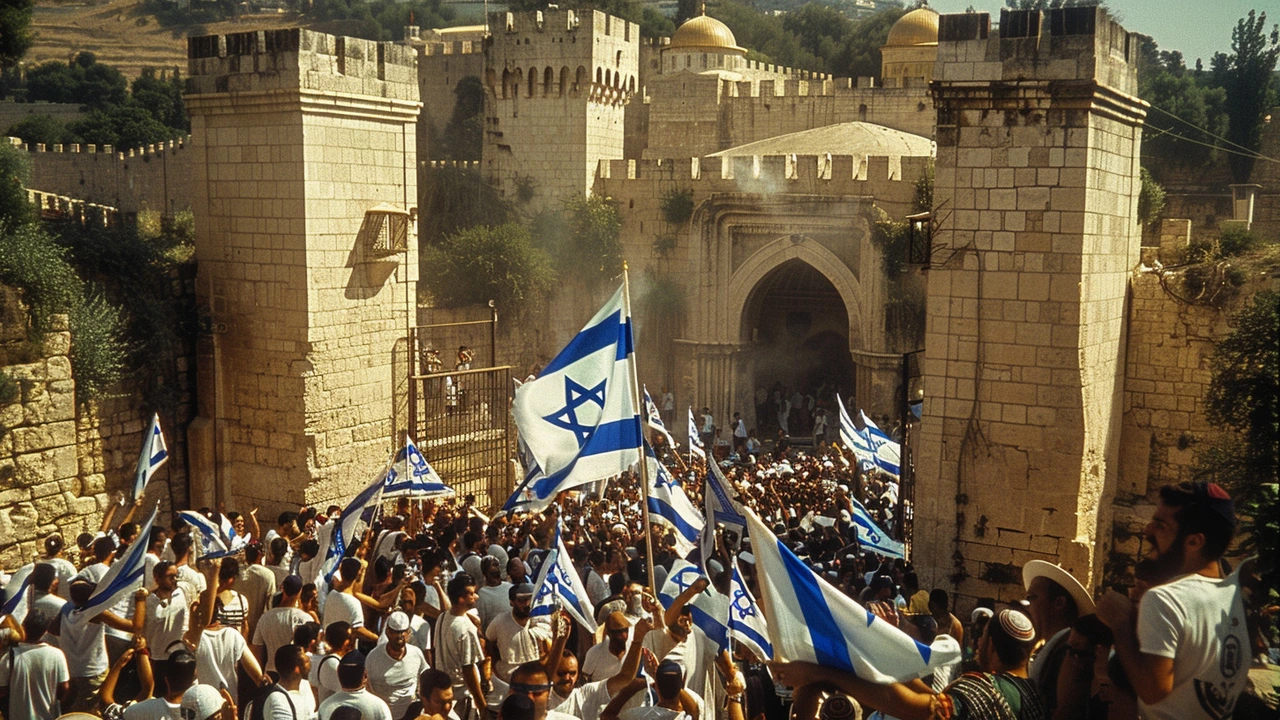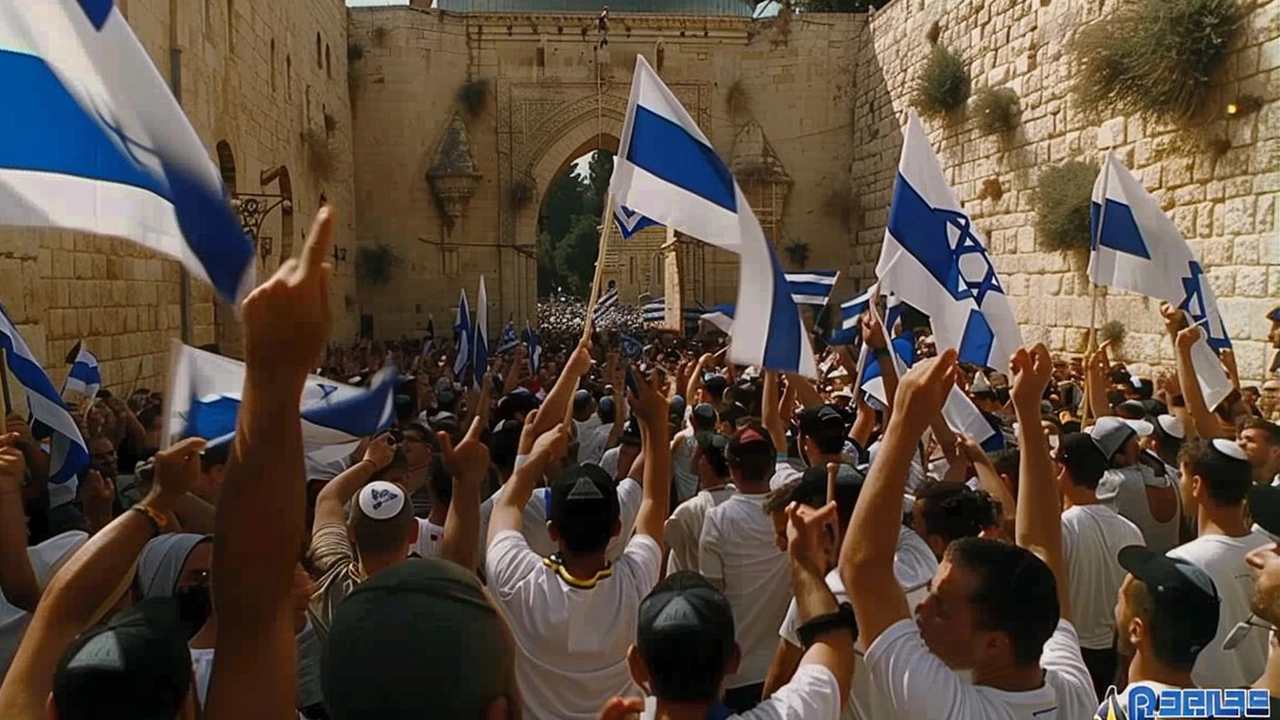 Jun, 6 2024
Jun, 6 2024
Thousands March During Jerusalem Day, Sparking Controversy
The annual Jerusalem Day Flag March took place on June 5, drawing thousands of ultranationalist Israelis to the Old City. Participants chanted inflammatory anti-Arab and anti-Islamic slogans, such as 'Death to Arabs' and 'May your village burn.' This particular event marks Israel's capture of East Jerusalem during the 1967 Mideast War, a pivotal moment that is often celebrated by Israelis but regarded as a dark day by Palestinians. The atmosphere was already charged with tension given the ongoing Israel-Hamas conflict, which reignited after an attack by Hamas on October 7.
Escalating Tensions and Clashes
The march did not proceed without its share of conflict. A small scuffle broke out between participants and police officers at the beginning of the event. Additionally, some individuals from the crowd threw plastic bottles at a journalist, further highlighting the volatility of the gathering. This year was particularly charged with National Security Minister Itamar Ben Gvir taking the stage to address the crowd. He declared, 'Jerusalem is ours,' encapsulating the nationalistic fervor permeating the event.
The event was met with significant resistance and concern. A total of 18 suspects were arrested on charges of violent offenses following various clashes during the march. For Palestinians, the event is provocative and deeply offensive, as it disregards their historical and emotional ties to East Jerusalem. Palestinians have long aspired to make East Jerusalem the capital of a future independent state. The division over the city's status remains one of the core issues in the Israeli-Palestinian conflict.

A City Divided: Jerusalem's Contentious Status
Jerusalem holds religious and cultural significance for multiple groups, making its status an especially sensitive and contentious issue. Israel considers the entire city its indivisible capital, a stance that is not internationally recognized. Conversely, Palestinians see East Jerusalem as a crucial part of a future Palestinian state. The Flag March underscores this deep-rooted divide, often bringing simmering tensions to the surface and sparking international concern.
It is important to note that the U.N. and many countries around the world do not officially recognize Israel's sovereignty over East Jerusalem. For these nations, East Jerusalem is considered occupied territory. The different claims over the city often lead to heightened tensions whenever events like the Jerusalem Day Flag March occur.
Symbolism and Insult
The slogans chanted during the march were not just words; they were blaring symbols of hatred and division. Such chants have the potential to ignite further animosity and violence in a region that is already fraught with conflicts. For many Israelis, the day is a celebration of unity and national pride. For Palestinians, however, it is a painful reminder of their ongoing struggles and the occupation of East Jerusalem.
This dichotomy was on full display during the march, emphasizing the complex and often volatile relationship between the two communities. Events like these have the power to exacerbate existing issues, making the prospect of peace even more elusive.

Looking Ahead: The Implications
The Jerusalem Day Flag March has sparked significant concern among local and international observers. The inflammatory rhetoric and ensuing clashes have the potential to incite more violence. Already, the situation has led many to recall the 11-day war in Gaza, which erupted from similarly charged events. The heightened tensions are a stark reminder of how fragile peace can be in this region.
Going forward, it is crucial for all parties involved to find ways to de-escalate the situation. Dialogue and mutual respect are essential for any hope of long-term peace. Celebratory events, especially those tied to contentious historical moments, should be approached with caution and sensitivity to avoid deepening the divide.
Ultimately, the Jerusalem Day Flag March serves as a vivid illustration of the enduring and complicated dynamics at play in Jerusalem. As tensions remain high, the march—and the reactions it provokes—highlight the ongoing struggle for control and identity in one of the world's most contested cities.
Both sides need to take steps toward understanding and reconciliation. Until then, the city of Jerusalem will remain a focal point of conflict and division, symbolizing larger tensions that permeate the Israeli-Palestinian conflict.

Debbie Billingsley
June 6, 2024 AT 23:35Enough of the anti‑Arab chants-Israel must stand firm and proudly celebrate Jerusalem Day without bowing to external criticism.
Patrick Van den Berghe
June 7, 2024 AT 02:22Jerusalem is our heritage no one can take away
Josephine Gardiner
June 7, 2024 AT 05:09The recent Jerusalem Day Flag March warrants a measured and comprehensive analysis, given its profound implications for regional stability. While participants exercised their democratic right to assemble, the overtly hostile chants directed at Arab citizens cannot be dismissed as mere rhetoric. Such expressions exacerbate long‑standing grievances and risk inflaming an already volatile environment. International law underscores the responsibility of state actors to prevent incitement to hatred, particularly in contested locales. Moreover, the presence of law‑enforcement officials attempting to mediate the situation illustrates an awareness of potential escalation. Nevertheless, the arrest of eighteen individuals signals that authorities are committed, at least procedurally, to upholding public order. Historical memory of the 1967 war continues to shape collective identity on both sides, rendering symbolic actions particularly potent. The flag march, therefore, functions as a litmus test for the resilience of Israel’s democratic institutions under stress. Critically, the slogans shouted overtly disparage an entire ethnic group, thereby contravening principles of mutual respect. The psychological impact on Palestinian residents of East Jerusalem should not be underestimated, as repeated exposure to such hostility can erode prospects for reconciliation. From a diplomatic perspective, foreign governments may perceive the event as indicative of a broader shift toward exclusionary nationalism. It is incumbent upon civil society leaders to articulate alternative narratives that emphasize coexistence. Academic discourse on the subject must remain vigilant against normalizing hate speech under the guise of patriotic expression. In sum, the march encapsulates the tension between freedom of expression and the imperative to safeguard communal harmony. The path forward demands a calibrated response that balances legitimate commemoration with an unequivocal repudiation of racist incitement. Only through sustained dialogue and robust legal frameworks can the cycle of antagonism be broken, thereby fostering durable peace.
Jordan Fields
June 7, 2024 AT 07:55Grammar matters. The slogans are unacceptable and violate basic civic discourse.
Divyaa Patel
June 7, 2024 AT 10:42Ah, the bitter taste of division, seasoned with a dash of historic theater! When chants echo like ancient war drums, we must ask whether the chorus amplifies truth or merely drowns out the murmurs of humanity. The city’s stones have witnessed prophets, kings, and countless blood‑soaked footfalls; now they listen to a modern hymn of hatred. One could argue that the march is a rightful assertion of identity, yet identity built upon the ashes of another’s grief is a fragile monument. In truth, the drama unfolds not on the flag‑bearing streets alone but within the hearts that absorb its rhetoric. The rhetoric, replete with lethal metaphors, transforms the sacred into a battlefield of words, where the wounded are both visible and invisible. The very act of chanting “Death to Arabs” reverberates far beyond the Old City walls, striking chords of alienation across continents. It is a performance that demands a rigorous audience-one that refuses applause for vitriol and instead calls for measured reflection. History teaches us that slogans are the low‑frequency bass of societal sentiment; if they exude venom, the entire composition collapses. The philosophical underpinnings of any nationalist expression must be examined through the prism of ethics, lest we mistake fervor for virtue. In the cascade of chants, the quiet voice of reason is often drowned, and that silence is a tragedy in itself. Let us, therefore, seek a narrative that embraces Jerusalem’s pluralistic legacy rather than shackling it to a single, exclusionary anthem. The city’s future depends on whether we choose to color it with bridges or walls. So, dear readers, contemplate the weight of each word, for words are the first stones we lay in the architecture of peace.
Larry Keaton
June 7, 2024 AT 13:29Yo, i get why folks feel proud but we gotta think bout the other side too. Calling out hate just makes sense, ya know? We can love our city and still be kind to everyone.
Liliana Carranza
June 7, 2024 AT 16:15Let’s channel that fire into building-not tearing down! 🌟 This is a moment to uplift, not to cast shadows over our neighbours. Together we can turn the chant of division into a chorus of unity.
Jeff Byrd
June 7, 2024 AT 19:02Oh sure, because chanting “May your village burn” totally helps the tourism board, right?
Joel Watson
June 7, 2024 AT 21:49The spectacle of zealotry on Jerusalem’s cobblestones is a stark reminder that nationalism, unchecked, borders on a performative art of exclusion. One observes the paradox: a populace that prides itself on democratic values yet indulges in rhetoric that erodes the very fabric of pluralism.
Chirag P
June 8, 2024 AT 00:35Respectfully, the rhetoric you describe not only undermines democratic ideals but also jeopardizes the delicate equilibrium that sustains coexistence in the region.
RUBEN INGA NUÑEZ
June 8, 2024 AT 03:22We need to address the root causes of such extremist displays, ensuring that security measures are balanced with respect for civil liberties.
Michelle Warren
June 8, 2024 AT 06:09Honestly this stuff is just old news. People always blow up over chants. Like, chill out already.
Christopher Boles
June 8, 2024 AT 08:55Stay hopeful! Even in tense moments, dialogue can bridge gaps and foster understanding among all communities.
Crystal Novotny
June 8, 2024 AT 11:42Hope is nice but ignoring the hate just lets it grow unchecked
Reagan Traphagen
June 8, 2024 AT 14:29We must ask who's really pulling the strings behind these marches-global elites seeking to destabilize a strategic ally while feeding the narrative of perpetual conflict.
mark sweeney
June 8, 2024 AT 17:15Conspiracies aside, the chants are real and they hurt. Not everything is a puppet show.
randy mcgrath
June 8, 2024 AT 20:02Reflecting on this, one might consider how collective memory shapes present actions, reminding us that empathy is essential for any lasting resolution.
Frankie Mobley
June 8, 2024 AT 22:49Practically speaking, community programs that bring Israelis and Palestinians together have shown measurable reductions in prejudice-such initiatives deserve more support.